Resources for Diverse Science Learners
Downloadable Resources
Energy Word Cards![]() pdf file or
pdf file or ![]() PowerPoint
PowerPoint
Materials Word Cards![]() pdf file or
pdf file or ![]() PowerPoint
PowerPoint
![]() PDF of Strategies That Support Diverse Science Learners
PDF of Strategies That Support Diverse Science Learners
In many, perhaps most, classrooms, there are students whose first language is not English; English may be very new, only somewhat familiar, and/or it may not be spoken at home. In science class, students will be introduced to both everyday English words and more specialized vocabulary. Some scientific language will be new to all students in the class.
What follows are some strategies, resources or tips that Focus on Energy teachers have found helpful for all students but with English Language Learners particularly in mind.
Science words
Science has its own vocabulary. Any student may find this a challenge but it’s particularly true for our students who are new to listening to and speaking English. These are three strategies for associating words and objects or processes. Every time you use a word, the goal is to have something visual or concrete to attach it to.
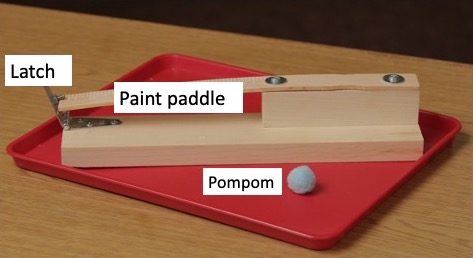
1. A set of labeled materials for display
For each investigation, keep a set of materials with labels on each of the parts visible and handy. As you use a term, hold up the object and point to the labeled part as you say the word. When students are sharing ideas or experiences with classmates, have the labeled materials nearby to provide a term if needed.
2. Hand motions or signals
For frequently used objects, materials or processes, create and use body language or hand signals.
Example: When referring to a "propeller," as you say the word, twirl your finger in the air.
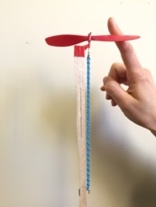
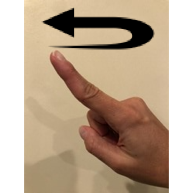
Example: As you say "transfer," move your hand holding an imaginary object from one place to another.
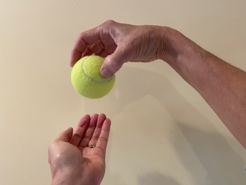
3. Word Cards
Go through the science unit you are about to teach and make a list of science materials or terms as they are first used in the unit. Make a Word Card for each term: the word, a sentence using or defining the word, and an image. Introduce each card as the term appears in the science unit and post it so it’s clearly visible throughout the unit.
This may be a piece of equipment such as a "ball," or "track," or "propeller," or "thermometer."
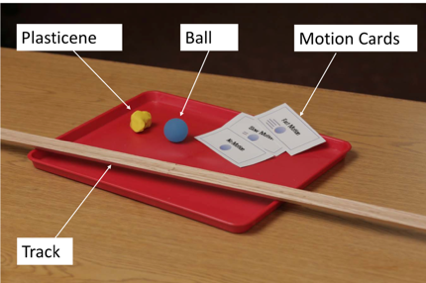
Or it may be a process such as "energy transfer," or "evaporation."
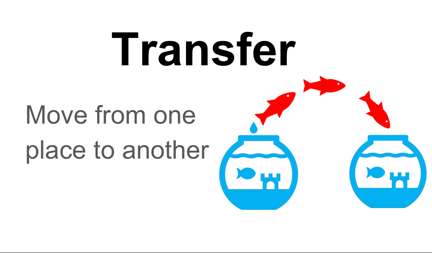
Or it may be something like a "representation," "graph," or "energy bars."
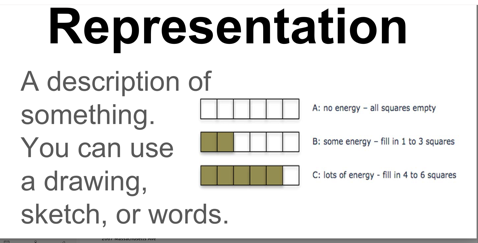
Some teachers make Word Cards on a PowerPoint slide deck that can be projected or printed out on full or half sheet or 4 slides per page. They can be posted for the class or distributed to each student.
You can download example words cards for Focus on Energy:
Download Energy Word Cards as a ![]() pdf file or
pdf file or ![]() PowerPoint file
PowerPoint file
Download Materials Word Cards as a ![]() pdf file or
pdf file or ![]() PowerPoint file
PowerPoint file
Some teachers like to have students help develop word cards:
- Make a set with word and definitions and ask students to create pictures
- Make a set with words and pictures and ask students to add sentences using or defining the words
- Make blank cards and ask students to add both pictures and definitions
Writing or Talking
Students have many ideas to enhance their own learning and enrich the classroom. Many students – whether they are just learning or fluent in English - may be unable or hesitant to express their science thinking in conversation or in writing. Discussion questions or writing prompts may have a high language load and be confusing. Here are some suggestions from experienced classroom teachers.
1. Keep instructions, questions and prompts short and simple.
- Provide instructions as a sequence of steps.
- Use drawings or diagrams for clarity and to reduce the amount of text.
- Use a consistent format for providing feedback.
2. Provide sentence starters.
Scaffold the response to questions by providing sentence starters.
Example:
Question: When a room temperature rock is put in a cup of hot water, what do you predict will happen to the temperatures? Explain your reasoning.
The temperature of the rock will
- _ increase
- _ decrease
- _ stay the same
I think so because _____________________________
The temperature of the hot water will
- _ increase
- _ decrease
- _ stay the same
I think so because _____________________________
3. Small group work
What do teachers say about small group work?
"It's 100% important! That’s how kids build their ideas and construct their thoughts and the meaning."
"So many of the aha moments come from collaborative work."
"Students make meaning as they speak and get immediate feedback from other people so they can refine their thinking. Those small group conversations are essential."
It is during small group work that students get to try out initial or partially formed ideas, practice expressing their ideas in a 'safe' setting, find words to express their ideas which helps clarify their thinking, and listen to the language of peers.
Small groups are typically 2, 3 or 4 students. Tips for productive small group work include:
- Provide objects or materials to think with
- Frame the activity as a time to explore and discuss ideas
- Be clear about what students are expected to do, how much time they have, and what they are accountable for – individually or as a group – when the time is up.
4. Full class work to share and summarize small group learning
When students share their small group experience, the class has another opportunity to see and hear science language associated with materials or objects, with processes and with tools such as graphs, diagrams or other representations. Repeated use of language relevant to their science learning - in the introduction to the lesson, as they engage in hands-on activity with peers, in small and large group discussion, and in notebook writing - helps all students and is essential for English Language Learners.
5. Provide options
There is more than one way for students to clarify and express their science ideas. When science teaching "went online" in 2020, teachers and their students found new software they liked as well as traditional ways to share their learning.
- Writing: traditional pencil/pen and paper writing or entries in a science notebook
- Talking or narrating a poster, drawing, or video
- Drawing labeled diagrams, flow charts, cartoons, etc.
- Making a small group poster
- Creating video that responds to a question, presents data or explains
- Acting out or reenacting, for example, demonstrating with a white board and energy cubes
- … and more